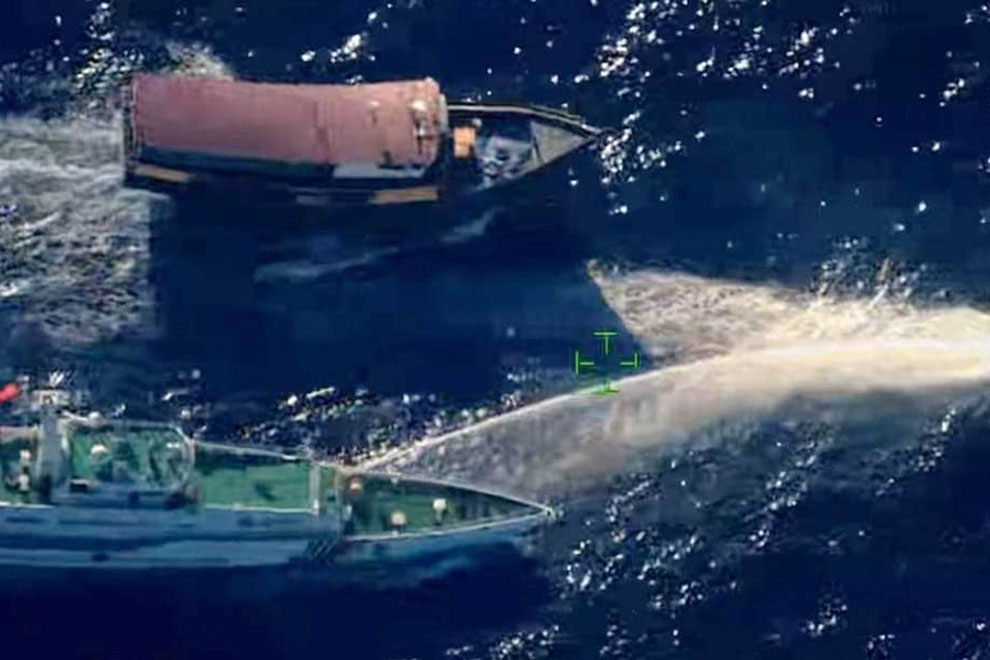
Upgrade to High-Speed Internet for only ₱1499/month!
Enjoy up to 100 Mbps fiber broadband, perfect for browsing, streaming, and gaming.
Visit Suniway.ph to learn
 A Chinese Coast Guard vessel fires its water cannon at Unaizah Mae 4 during a Philippine resupply mission for Filipino troops stationed on BRP Sierra Madre in Second Thomas Shoal on March 5, 2024. — ARMED FORCES OF THE PHILIPPINES
A Chinese Coast Guard vessel fires its water cannon at Unaizah Mae 4 during a Philippine resupply mission for Filipino troops stationed on BRP Sierra Madre in Second Thomas Shoal on March 5, 2024. — ARMED FORCES OF THE PHILIPPINESBy John Victor D. Ordoñez, Reporter
THE PHILIPPINE presidential palace on Thursday urged China to respect Manila’s freedom to boost military ties with Washington and stop meddling in its foreign affairs to keep regional peace.
“Whatever actions we take or projects we pursue regarding our military operations, these are entirely our decisions, and no one has the right to interfere,” Presidential Communications Office Undersecretary Clarissa A. Castro told a news briefing. “We are independent, and no one should meddle in the decisions of our government.”
The Chinese Embassy in Manila did not immediately reply to a Viber message seeking comment.
The Chinese Foreign Ministry on Tuesday urged the Philippines to stop “serving as other countries’ mouthpiece and more stunts for personal political agenda” ahead of US Defense Secretary Peter Hegseth’s visit to Manila on Friday.
“Any defense or security cooperation between the Philippines and other countries should not target any third party or harm their interest, still less threaten regional peace or escalate tensions in the region,” Chinese Foreign Ministry spokesman Guo Jiakun told a news briefing in Beijing on Wednesday.
“Our message to some in the Philippines: Stop serving as other countries’ mouthpiece and no more stunts for personal political agenda.”
The US Defense chief will visit the Philippines on March 28 to 29 for a meeting with Philippine President Ferdinand R. Marcos, Jr. and Defense Secretary Gilberto C. Teodoro, Jr., with talks expected to center on advancing Manila and Washington’s defense ties, the US Embassy in Manila said in a statement last week.
“The Philippines is no one’s chess piece; we are an independent country,” Ms. Castro said.
China’s ineffective strategic communication on interference in our military’s internal affairs brings further rift between Beijing and Manila, Chester B. Cabalza, founding president at Manila-based think tank International Development and Security Cooperation, said in a Facebook Messenger chat.
“The Philippines has every right to manage its own alliance,” he said. “What China wants to see is for the Philippines to fail and mismanage our security alliance with the US.”
“It is China that is undermining our independence and sovereignty. If that’s how the Chinese politburo sees us with our relationship with the US, then China does not fathom alliance management at all,” he added.
The Armed Forces of the Philippines on Tuesday said Mr. Hegseth’s visit reaffirms the US’ “ironclad” commitment to its oldest treaty ally in Asia.
The US Defense chief’s trip to the Philippines comes on the heels of his tour to Hawaii and Guam, where he would meet military leaders overseeing the Pacific region. He will also visit Japan, another Asian ally of the US that has been at odds with China over Senkaku Islands.
China claims more than 80% of the South China Sea based on a 1940s map, which a United Nations-backed arbitration court in The Hague voided in 2016 for being illegal.
Philippine and US army soldiers on Monday started three weeks of joint military exercises that focus on territorial defense and commanding large-scale deployment of forces.
About 5,000 soldiers from the Philippine Army and US Army Pacific will take part in warfighting and exchange of expertise in the first phase of this year’s Exercise Salaknib. A second phase is scheduled for later this year.
Manila has been at the forefront of efforts to contest Beijing’s expansive sea claim, deepening security ties with western countries and regional allies like Japan and Australia.
The war games between Manila and Washington’s forces have focused on enhancing the Southeast Asian nation’s ability to defend its territory from external threats, conducting past drills near potential flashpoints of the South China Sea and self-governed Taiwan, which Beijing considers a renegade state.
The People’s Daily, the newspaper of the governing Communist Party, has urged the Philippines to give up the Typhon missile system, which was deployed by US forces to the Philippines in April last year as part of joint military exercises to keep the peace in the region.
The Philippine President earlier said he was willing to pull out the US Typhon missile system once China stops its aggression in the South China Sea.
The US is the Philippines’ major security partner, with a 1951 Mutual Defense Treaty compelling both nations to defend each other in case of an armed attack.
Washington’s military has moved its Typhon launchers, which can fire multipurpose missiles up to thousands of kilometers, from Laoag airfield to another location on the island of Luzon, Reuters earlier reported.
The Philippines secured an exemption from the 90-day funding freeze that US President Donald J. Trump ordered in January so it could receive $336 million for the modernization of its security forces.
‘REAL WAR’
“If China truly believes in and is concerned about peace and stability in the region, it should abide by international law and respect the sovereignty of each country,” Ms. Castro said.
“If both parties continue to engage in word war, only time will tell when the real war will occur between the two countries,” Rommel C. Banlaoi, president of the Philippine Society for International Security Studies, said in a Viber message. “But we can avoid war and prevent armed conflicts through amity and cooperation within the principles of peaceful coexistence, mutual respect and due regard.”
Meanwhile, the Philippine Defense department said it seeks to strengthen security ties with Cambodia after a recent courtesy call by Lieutenant General Rath Dararoth, Cambodian secretary of state for the Ministry of National Defense on Mr. Teodoro on March 25.
“Secretary (Teodoro) expressed optimism about strengthening defense ties between the Philippines and Cambodia,” the agency said in a statement on Thursday. Mr. Dararoth agreed to deepen bilateral cooperation between the two Southeast Asian nations, it added.
“He extended his appreciation for the Philippines’ continued support, particularly in education and training programs,” it added.
Earlier, President Ferdinand R. Marcos, Jr. said the Philippines should hold more frequent military training exercises with Cambodia to coordinate efforts in addressing the security challenges in the South China Sea and Indo-Pacific Region.
The South China Sea is a vital waterway for more than $3 trillion worth of annual ship-borne commerce. China, the Philippines, Brunei, Indonesia, Malaysia and Vietnam have competing sea claims.
Mr. Teodoro said the Philippines would continue to engage with its regional peers to strengthen defense ties.
During the meeting, Mr. Teodoro cited the need for regional cooperation in tackling security issues and promoting mutual growth.
On Tuesday, the Philippines and Cambodia held their fourth joint defense cooperation committee meeting in Manila, where they tackled national defense plans and cybersecurity.
The Cambodian envoy said these dialogues are key to bolstering defense partnerships and regional stability. — with Adrian H. Halili




